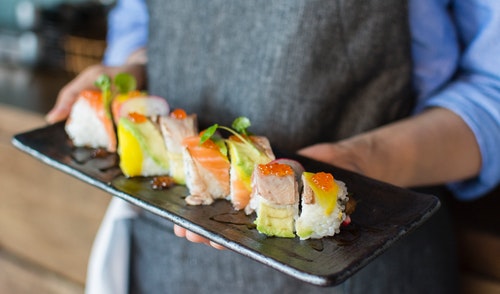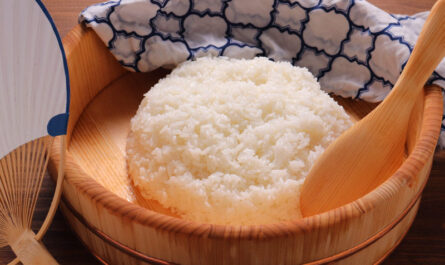Have you ever eaten sushi? Or rather, did you grow up eating sushi? If you haven’t, we are sorry, but we are here for you. It is a great batch that is very refreshing and full of flavour. It is made of unlimited flavours, catering to all individuals’ tastes and preferences. Sushi leaves one full and with great satisfaction.
Moreover, it leaves one with many cravings for more. It is one of the most pleasurable foods that people adore in their lives. It is a healthy meal that is convenient to cook or place an order in various malls all over the globe. It is also attractive and pleasing in its appearance as it is to eat.
If the perfect food existed, sushi would be rated at number nine out of ten as a strong contender. However, consumption of a bad batch can leave one hovering in a pile for hours. This is a result of consuming it after its shelf-life is spent. Sushi has been served for centuries in Japan and United States. Some of the things we are going to look at are what sushi is, its constituents, how it is prepared and preserved. In addition, how different types of sushi last, what affects the shelf-life of sushi, how to tell if sushi has gone bad and lastly, the article’s conclusion by recommending how long sushi can last.
What Is Sushi?
The term sushi means sour taste. It is among the oldest inventions in the culinary world. It is time-honoured Japanese seafood. It is more of a general food category than a specific dish, just like pasta which has a broad category of recipes and dishes. The combination of its different constituents brings out beautiful bite-sized pieces of freshness. The pieces of flesh produced are colourful and appealing to the eyes, just like their flavours. Some of the ingredients used to make sushi include; sushi rice which is always sticky, vinegared rice. It is available in short and medium sizes. We also have fish like tuna, yellowtail and amberjack. Sometimes it uses fish, although it’s not a requirement.
There is other seafood such as lobster, shrimp and squid. In addition, we have fresh ingredients such as fruits like mango, avocado, cucumbers and veggies. The last category of ingredients is dried seaweed which significantly assists in binding together the sushi rolls. Sushi is always served in a petite, delicate size that is to be eaten slowly and savoured. Depending on one’s pallet, the dish is often accompanied by ginger or soy sauce.

How Long Does Sushi Last?
Those who have had a bad batch can tell it is one of the worst experiences they have had. They can tell how it makes one sick. One is forced to spend a lot of time in the bathroom after eating it. It makes one feel like it will now be an exceptional meal. However, we are here to let you know sushi was not the main problem. It was a matter of time. Sushi has a very finite duration due to its ingredients which cannot last long. Ingredients used to make sushi are fresh such as veggies and fruits making it vulnerable to the passage of time. Sushi lasts for not more than four days. During that period, it should remain under refrigeration. After taking it for eating, it should not be returned back to the refrigerator.
The other ingredients, such as seafood and fish, are also vulnerable if time is not considered, as they die immediately and are taken out of the water. The faster they are taken to the table, the better and safer for an individual’s health. After fishing, they are frozen in order to be transported to the respective destination for sushi preparation. One can tell where the illness caused after eating sushi lies.
How Do Different Types Of Sushi Last?
The lifespan of sushi depends on the ingredients of the roll. For sushi with raw fish, it is recommended to be taken within 24 hours. Taking raw food increases the risk of food poisoning, which results in vomiting, diarrhoea and stomach cramps.
Sushi with veggies can last for about five to seven days. However, the veggies will have wilt in quality after a while. Sushi with other ingredients, such as cream cheese, vary in their expiry date. If the sushi smells fishy, it is better tossed for preservation and safety for individuals.
What Affects The Shelf Life Of Sushi?
Sushi and its various dishes are made with fresh ingredients that do not have a long lifespan. Shelf life is affected by two main aspects. That is the freshness of the ingredients and cold chain. The first aspect is the freshness of the ingredients. Any constituents, be it be plant or meat, has a brief life span in the shelf-life. Immediately they are taken from the preservative environment, and the clock starts ticking. For example, a fish starts after being caught. They are frozen to keep them from expiring, although that doesn’t preserve the fresh fish taste.
For plant ingredients that got a bit longer lifespan than the fish, Plants only decompose when the outer covering is removed. Different components have their own shelf-life duration. The other aspect that affects the shelf –life of sushi is the cold chain. If the procedure of managing perishable foods under cool temperatures is observed, sushi will be less likely to go bad. To prevent the risk of sushi going bad, refrigeration is advised.
How Can One Tell That Sushi Has Gone Bad?
We have various ways that you can identify sushi that has gone bad .one of the methods is through sight. By keenly looking at each ingredient, you can tell if they are still fresh. For example, it’s straightforward to tell fresh vegetables and fruits because some discolour when not new. If there is any slime discharge from a fish, one can tell it’s not fresh.
The second aspect is the smell. If you smell a sour odour, it is an indication of rotten sushi. If a fish produces a strong odour, it indicates risky fish.
In conclusion, we can depict that sushi does not have a long lifespan. In addition, sushi’s lifespan varies with its ingredients. Those with highly perishable produce do not last for an extended period. Sushi with plant produce is preferred over those seafood because of the risk of safety.



